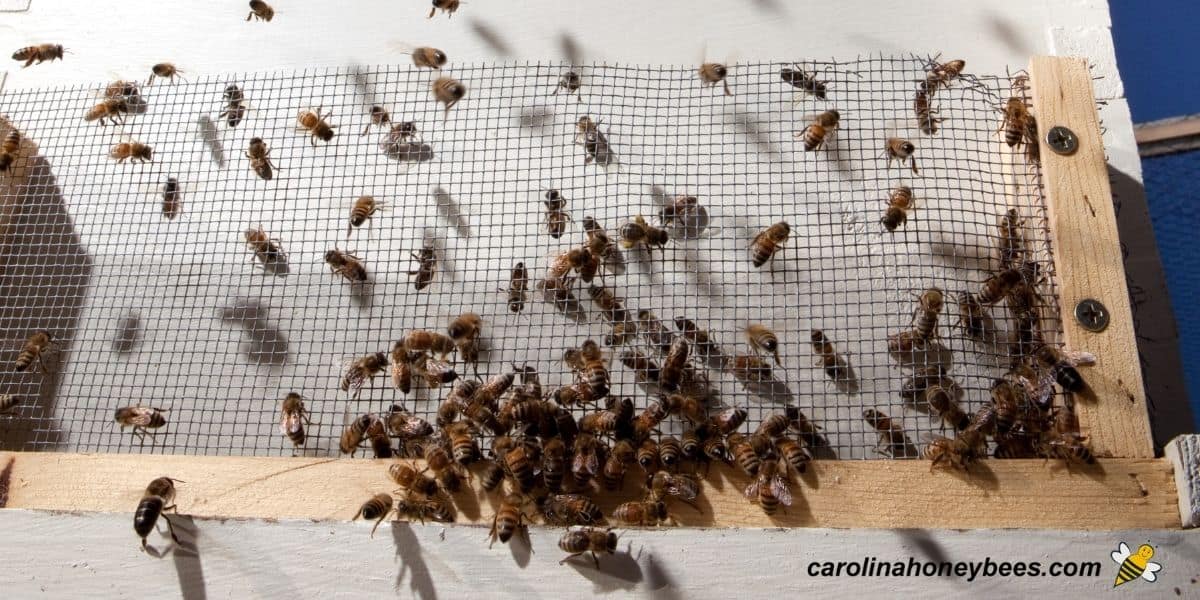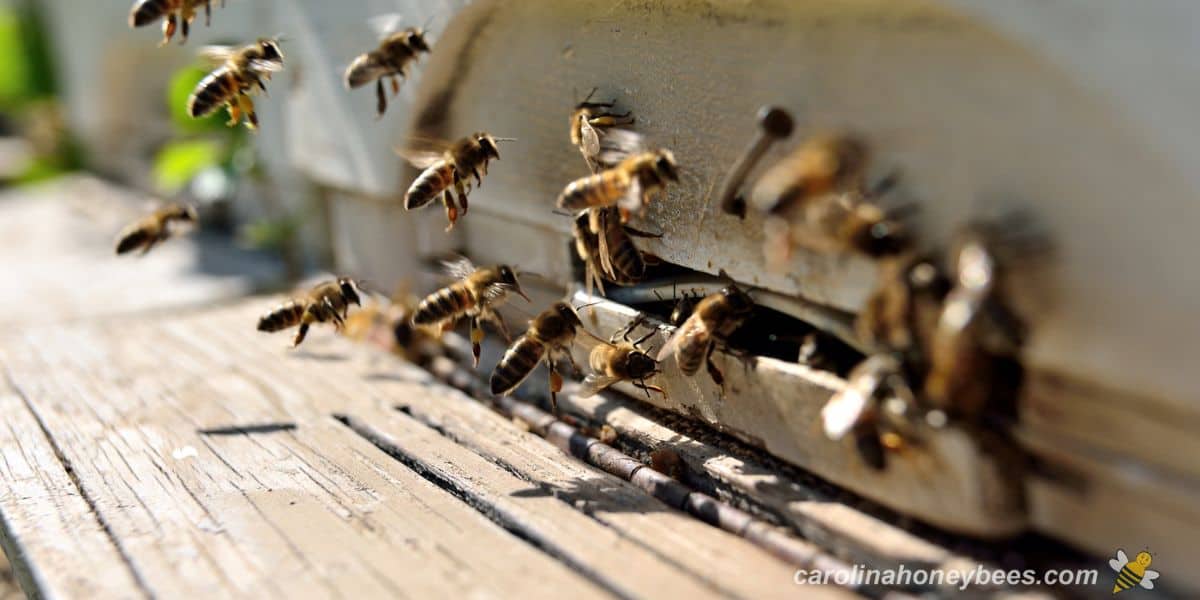Robber Honey Bees
Robbing in honey bees causes stress for beekeepers and harms honey bee colonies. Honey bees involved in robbing are normal workers that invade other hives and steal honey. This theft and the resulting fighting that takes place can weaken or completely kill the victim hive. While this may be an instinctive survival strategy, it causes many problems for beekeepers. In this article, I will share the basics of robbing bees, how to recognize the problem and some tips for prevention and control.

I’ve learned a lot over the years as a beekeeper. We work with bees – we can not control them. But, if you want to excel in any type of beehive management – you must observe conditions in and near the hive and be able to recognize problems.
What is Robbing?
Robbing occurs when worker bees enter another hive (not their own) and steal honey or sugar water. Pollen and baby bees are usually safe from theft but honey is a “high-theft” item.
This can be a highly aggressive event with bees fighting to the death at the hive entrance. Even if the robbing bees are repelled – the resident hive is very stressed and may lose significate population. The colony that the attacking bees belong to can also be negatively impacted.
The root cause of the behavior is founded on instinct and environmental conditions. Acquiring enough food for the bees to survive the winter is the annual goal of any colony. Sometimes, nectar is in short supply.
Causes of Robbing
There are several situations that contribute to the likely hood of seeing robbing behavior in your bee yard.
- lack of nectar
- weak colonies
- poor hive management
Foraging bees work tirelessly to gather nectar and pollen for the hive. If little or no nectar is in the field, the bees will frantically look elsewhere. They smell honey in a hive over there….. hmmm.
Weak colonies are a perfect target for robber honey bees. Weak (in population) does not always mean the hive is sickly. Perhaps this is a small swarm you caught, a new bee package or even a small beehive split you have made?
Weak colonies may be unable to defend their hive and be completely overcome by intruders. Many beekeepers have had small mating nucs destroyed by robbing bees during a drought or nectar dearth.
And sometimes, we beekeepers cause the problem ourselves. Keeping the hive open too long during hive inspections – allowing the honey aroma to spread. Or worse, being slopping when feeding bees sugar water and spilling it.

How to Identify Robber Bees
A robbing event often comes as a surprise to the beginning beekeeper. The most common signal of a problem is a mass of bee activity at the front of the hive.
Unfortunately, bees do not wear jerseys – so unlike a football game – it can be hard at a glance to tell which team they are on!
Fighting
Look for fighting or wrestling at the hive entrance. Robber honey bees want in and the resident hive guard bees are trying to keep them out. You may also see dead bees laying on the landing board or the ground.
Bees Searching For Entrance
Another common sign of robbing in my bee hives is having many bees looking for ways inside – but not just at the entrance.
They fly around the cracks where the boxes fit together and any ventilation hole – looking for a way to get in. You do not normally see that in a colony that lives in the hive – they know where the front door is.

Difference Between Orientation Flights & Robbing
Take a walk with me to the bee yard. It is mid afternoon, or the morning after a rainy day. We see hundreds of bees flying around in front of the hive.
Is this trouble? Likely – no. If the congestion is only for a short time, you are witnessing a cleansing flight or orientation flight.
Honey bees leave the hive to expel wastes (bee poop) outside. Young adults also make short orientation flights to learn the hive location.
Orientation and cleansing flights will normally settle down after 10 – 15 minutes. Robbing bees can go on for hours or days.
If the activity slows down after a short while and you do not see fighting at the hive entrance – it is likely not robbing bees.
This post may contain affiliate links. As an Amazon Associate, I earn from qualifying purchases. Please read my disclosure.
How to Stop Robbing in Honey Bees
Robbing is bee chaos. A beekeeper often feels helpless in this situation. I know that I have felt helpless when it is going on in my hives.
It is not always easy to stop robbing bees but you have to try. Here are a few tips that may help you save your hive:
- narrow the opening of the hive entrance
- don’t use a smoker
- relocate weak hives
- disguise the hive entrance
- move weak hives
- use robbing screens
Robbing will continue until the colony is killed and resources depleted. Robbing must be stopped – doing nothing is not an option.

Narrow the Hive Entrance
You can narrow the hive entrance (make it smaller) with pieces of wood or grass or screen but purchased entrance reducers are inexpensive and work well.
A smaller entrance is easier to guard. Close any gaps between boxes or extra holes. You want only 1 small entrance (1-2″) to the hive until things settle down.
Don’t Use the Smoker
Leave the bee smoker in your tool box. Smoking will not work to stop robbing honey bees. Smoke does affect bees and make them move, but -in this situation it seems to add to the confusion and does not slow down the fight.
Disguise the Entrance
The use of a wet towel to stop robbing is a popular beekeeper technique. Hanging a wet bath towel over the front of the hive under attack (in front of the entrance) discourages the invading robbers.
The resident bees figure out how to get behind the towel and enter the hive. Most of the attackers will buzz around in front of the hive. I sometimes use use a Canvas Drop Cloth cut into half for this.
Use Water
Another method I have used with some success to slow down bee robbing is the sprinkler method. A water sprinkler with a waterfall setting is used to rain down on the victim hive.
This causes robbers to return home. It also gives the beekeeper a chance to get control of the situation. Robber bees go home at night. But, you will still need to do some preventive measures or they will start again in the morning.
Relocate Weaker Hives
Most of us do not have a good place to move the weaker hive. But, if you do, relocate or move the beehive under attack to another location for a few weeks.

Use Robbing Screens
Another option to control this problem is the use of robbing screens. The basic design allows bees to come and go from the hive at a reduced rate – and hides the entrance somewhat. I made this one with some pieces of wood and screen.
This stops a horde of invaders from entering the hive in large numbers. Robbing screens come in a variety of styles.
Some types are made in a manner that allows you to completely close the hive. This is handy when you need to move a beehive from one location to another.
This is not something that you keep on the hive all Summer. Why? Well, the last thing you want to do is slow down the members of the colony during the honey season.
However, it is not a bad idea to have a few screens on hand for when you need them. You can also build your own robbing screens.
The simple concept is to move the gateway leading to the hive entrance. Bees who live in the hive – figure it out. Most of the honey bee robbers do not learn how to find the entrance.
Beekeeper Tips
Takes these steps to decrease the likelihood of robber bees getting started in your apiary.
- Don’t be messy in the bee yard. Don’t spill sugar water when refilling any type of bee feeders. Any pieces of wax or burr comb should be collected and taken away from the hive area.
- Use entrance reducers and keep the opening small (especially) for weak colonies.
- If your colonies are starving due to a dearth, feed them.
- Equalize colony strength by moving frames of bee brood between colonies. Be careful not to move the queens! Spray the moved frames with a light mist of sugar water to reduce fighting.
- Anything that opens a hive – i.e. performing a hive inspection can create robbing situations. During times of dearth, keep your inspections brief.
FAQs
The defending colony will battle to their death. Once the majority of the guards in the hive being attacked are dead, the frenzy continues. The queen bee may be killed by the robbing bees
The threat of robbing in honey bees increases during times of a lack of natural nectar. It can occur at any time during the warm season. But, long hot dry summers often result in problems with robbers.
Yes, as worker rob out weak or sick colonies, there is a risk of spreading disease and pests (like varroa mites).
Final Thoughts
Once you notice robbing starting-it is time to intervene before it goes too far. Sometimes you will not be successful, but your help may be enough to make the attack not worth the effort. In the timeless fight for survival, this is a natural behavior in the insect world. But we don’t like seeing it happen – use good beekeeping practices and hive management to reduce robbing.

